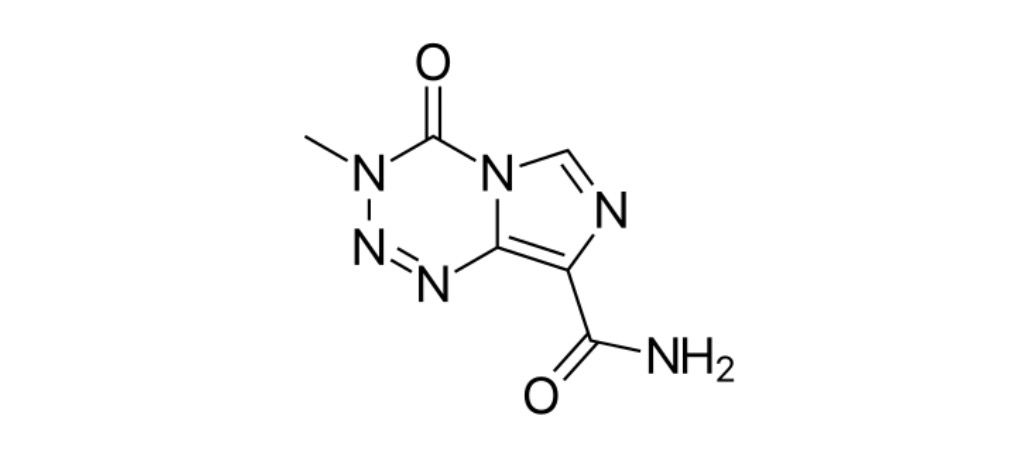Temozolomide

Overview
Temozolomide is an oral chemotherapy medication classified as an alkylating agent. It is primarily used to treat certain types of brain cancer, including glioblastoma multiforme and anaplastic astrocytoma, in patients whose tumors have returned or are newly diagnosed. The drug works by slowing or stopping the growth of cancer cells, thereby helping to control tumor progression and improve patient outcomes.
Background and Date of Approval
Temozolomide was first approved by the U.S. Food and Drug Administration (FDA) in 1999 under the brand name Temodar. It was developed to overcome the limitations of previous treatments for brain cancers, particularly in crossing the blood-brain barrier. Over the years, its indications have been expanded, and it remains a standard treatment option for glioblastoma and anaplastic astrocytoma.
Uses
Temozolomide is indicated for the treatment of adult patients with newly diagnosed glioblastoma multiforme, in combination with radiotherapy, followed by maintenance therapy. It is also used for the treatment of adult patients with refractory anaplastic astrocytoma, i.e., patients who have experienced disease progression on a drug regimen containing nitrosourea and procarbazine. These indications are based on clinical trials demonstrating improved survival rates and tumor control.
Administration
Temozolomide is administered orally in capsule form. The dosing regimen varies depending on the specific indication and patient factors. For newly diagnosed glioblastoma, the recommended dose is 75 mg/m² once daily for 42 days, starting concurrently with radiotherapy. After this initial treatment phase, maintenance therapy is initiated with a dose of 150 mg/m² once daily for 5 days every 28 days. For refractory anaplastic astrocytoma, the recommended dose is 150 mg/m² once daily for 5 days every 28 days. Dosing adjustments may be necessary based on individual patient response and tolerability.
Side Effects
Common side effects of temozolomide include nausea, vomiting, loss of appetite, fatigue, constipation, and headache. These side effects are generally manageable and may subside as the body adjusts to the medication. Supportive care measures, such as antiemetics, can be used to alleviate symptoms.
Warnings
Serious adverse events associated with temozolomide include myelosuppression, which can lead to neutropenia, thrombocytopenia, and anemia. Regular blood count monitoring is essential during treatment. Other serious risks include liver toxicity and increased risk of infections. Patients should be monitored for signs of these adverse events, and dose adjustments may be required.
Precautions
Before starting temozolomide, patients should undergo a thorough evaluation of their medical history, including any history of bone marrow suppression or liver disease. Concomitant use of other myelosuppressive agents should be avoided unless closely monitored. Patients should be advised to inform their healthcare provider of all medications they are taking, including over-the-counter drugs and supplements, to avoid potential drug interactions.
Expert Tips
Prescribers should ensure that patients are adequately hydrated and receive appropriate antiemetic therapy to manage nausea and vomiting. Regular monitoring of complete blood counts is crucial to detect any early signs of myelosuppression. Pharmacists should counsel patients on the importance of adhering to the prescribed dosing schedule and the need for regular follow-up appointments to assess treatment efficacy and safety.
FAQs
What is Temozolomide?
How is Temozolomide administered?
What are the common side effects?
Are there serious risks associated with Temozolomide?
How should Temozolomide be stored?
References
1. https://reference.medscape.com/drug/temodar-temozolomide-342229#91
2. https://www.micromedexsolutions.com/micromedex2/librarian/CS/83245C/ND_PR/evidencexpert/ND_P/evidencexpert/DUPLICATIONSHIELDSYNC/95B806/ND_PG/evidencexpert/ND_B/evidencexpert/ND_AppProduct/evidencexpert/ND_T/evidencexpert/PFActionId/evidencexpert.DoIntegratedSearch?SearchTerm=TEMOZOLOMIDE&UserSearchTerm=TEMOZOLOMIDE&SearchFilter=filterNone&navitem=searchALL#
3. https://www.cancer.gov/about-cancer/treatment/drugs/temozolomide
